GUOJIA ANQUANBU, MINISTERE DE LA SECURITE D'ETAT CHINOIS. Si il y a un service qui doit aujourd'hui attirer l'attention de la communauté du renseignement, c'est incontestablement celui-la. Le Guojia Anquanbu,créé en 1983,n'a cessé depuis de monter en puissance,aussi bien dans le domaine du renseignement extérieur que dans la lutte contre l'espionnage. On peut retenir ,par exemple,les déclarations de John Brenner, patron du NCIX (National Counterintelligence Executive) qui déclara en mars 2007 que les services secrets chinois sont parmi les plus actifs sur le territoire américain,déplorant les fuites de technologies vers la Chine communiste, et l'infiltration du contre-espionnage américain.Brenner citera en exemple l'affaire Leung, cette femme d'affaires chinoise arrêtée en 2003 qui a soutiré des informations a son amant, officier du FBI spécialiste de la Chine,puis les a transmises a Pékin.
Le Guojia Anquanbu, appelé aussi Guoanbu, (Ministry of State Security, MSS) a été créé le 06.06.1983, et fut inauguré le 01.07.1983.Officialisé lors de la 1ère cession de la VI ème Assemblée Nationale Populaire. Il récupère les fonctions de contre-espionnage du Gonganbu,de renseignement extérieur qui était dévolu au Central Investigation Department (Diaochabu), et est aussi chargé de la protection des frontières et de la lutte contre les déviances idéologiques (Les opposants). Ses missions sont donc de protéger la souveraineté et les intérêts de l'Etat. Les tâches sont ainsi mieux séparées: Le Guojia Anquanbu s'occupe de la Sécurité de l'Etat,le Gonganbu de l'ordre public et de la lutte contre la criminalité.
Ling Yun, vice-Ministre du Gonganbu depuis 1964, prend le commandement du nouveau Ministère de la Sécurité d'Etat,et dans une conférence de presse qui se tient peu après la création du service,fin juin 1983, il dénonce l'augmentation des activités d'espionnage contre la RPC et des sabotages, et fait appel a la population pour aider les services de la sécurité d'Etat a lutter contre les espions.
A peine créé le Ministère de la Sécurité d'Etat se jette dans la bataille: Il faut a la fois lutter contre les sabotages, les réseaux des services secrets étrangers (Un des plus dangereux étant le renseignement taïwanais), mais aussi, avec la CIA , coordonner l'aide aux rebelles afghans se battant contre les soviétiques. En 1984, peu après la mort de Youri Andropov au Kremlin, le patron de la CIA Bill Casey se rend en Asie. De passage a Pékin, avec le chef de la Station de la CIA a Beijing Ted Price, il négociera avec Ling Yun l'aide aux moudjahidins afghans.
Il faut aussi établir des contacts avec les autres services secrets. Ling Yun part donc a la tête d'une délégation pour Belgrade avec Yang Dezhong (Directeur-adjoint du département des affaires générales du Comité Central du Parti communiste chinois) ou il arrive le 29.02.1984 , avec pour but la coopération entre les services secrets des deux pays. Le 05.03.1984 ils seront recus par Franko Heoljvic, membre du Présidium du Parti communiste yougoslave, ce qui paraît démontrer l'intérêt des yougoslaves pour leurs homologues chinois. Une autre délégation du MSS arrivera a Belgrade le 09.10.1986, a l'invitation de Dobroslav Culafic, Secrétaire Fédéral pour les affaires intérieures. Elle est dirigée par Jia Chunwang, le remplacant de Ling Yun a la tête du Guojia Anquanbu. Pourquoi ce remplacement si rapide du Ministre?
Le MSS remporte pourtant très vite ses premiers succès dans la lutte contre les services secrets étrangers , avec le démantèlement d'un réseau a la solde des services secrets taïwanais,ce qui paraît consolider la position de Ling Yun a la tête du MSS. L'information est rendue publique début 1985, mais on ignore quand les personnes ont été arrêtées et jugées.Leur condamnation,selon le MSS, aurait eu lieu peu avant. Ont interpellées trois personnes, parmi elles: Xin Peiwen, 46 ans, acteur dans une troupe culturelle de l'armée, qui aurait contacté les services secrets taïwanais en octobre 1983 et aurait fourni a ses services un document top-secret (il n'est pas précisé quoi) en mars 1984. Le rapport public du MSS accusera M.Peiwen d'avoir collecté des renseignements a caractère politique et militaire a Pékin et d'avoir incité des pilotes de l'armée de l'air a faire déféction. Les deux autres seraient Su Mao, 27 ans, musicien dans une troupe du Ballet de Pékin,et son oncle de 39 ans,acteur lui aussi dans une troupe,qui aurait commencé a travailler pour les taïwanais alors qu'il était a l'étranger en avril 1982. Ce n'est pas le premier coup du Guojia Anquanbu contre les services secrets de Formose,puisque selon un rapport du MSS,entre septembre 1984 et février 1985 12 personnes ont été identifiées comme espions taïwanais. L'une a même été éxécutée. Et Le service réussit aussi a neutraliser un informateur de la CIA, Lo Fu, un journaliste de Hong Kong.
Mais quand il parlait de l'activation des services secrets contre la Chine, le Ministre de la Sécurité d'Etat ne croyait pas si bien dire,puisqu'il est confronté,a la mi-1985, a la déféction d'un cadre de son propre service;Yu Shenzan,du service du contre-espionnage du MSS,fuit a Hong Kong puis est exfiltré par la CIA...Devant le scandale, Ling Yun démissionne. Il est remplacé par Jia Chunwang, lequel conservera son poste de 1985 a 1998, avant d'être remplacé en mars 1998.
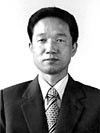 Jia Chunwang, Ministre de la Sécurité d'Etat de 1985 a 1998. Il fut ensuite Ministre de la Sécurité Publique (La police chinoise) de 1998 a 2002. Il a ensuite exercé les fonctions de Procureur général adjoint du Parquet populaire suprême de décembre 2002 a mars 2003 avant d'être élu Procureur général du Parquet populaire suprême en mars 2003.
Jia Chunwang, Ministre de la Sécurité d'Etat de 1985 a 1998. Il fut ensuite Ministre de la Sécurité Publique (La police chinoise) de 1998 a 2002. Il a ensuite exercé les fonctions de Procureur général adjoint du Parquet populaire suprême de décembre 2002 a mars 2003 avant d'être élu Procureur général du Parquet populaire suprême en mars 2003.
Le MSS continue son travail, par exemple en mettant au point en 1987 une directive visant a limiter et contrôler les contacts entre chinois et étrangers. Le Parti communiste chinois prévient de son côté ses adhérents de ne pas parler avec les correspondants des journaux étrangers sans une autorisation expresse.. Seront par exemple expulsés le correspondant de l'AFP Lawrence Mc Donald en janvier 1987 ou son homologue japonais du Kyodo News Service Shuitsu Henmi en mai 1987.
Le MSS se retrouve plus que jamais a lutter sur plusieurs front a la fois: Il s'implique donc aussi bien dans la répréssion des dissidents en 1989 (Lors des événements de la Place Tian An Men) que contre tout ce qui peut menacer le pouvoir chinois,en y voyant souvent la main des services secrets taïwanais, comme le montre l'article du 24.06.1989 de la BBC (en fin d'article).A l'occasion de la répression de la Place TianAnMen, plusieurs étudiants disparaissent. Certains réussissent a quitter la Chine,par l'intermédiaire de filières créées par les différents services de renseignement occidentaux (DGSE, CIA, MI6) et visant a les faire passer a Macao ou Hong-Kong.Cette opération est connue sous le nom de YELLOW BIRD. Le MSS tentera d'infiltrer ses filières,par exemple en dépêchant une équipe a Canton.
D'autres étudiants sont eux arrêtés.Le MSS sera accusé d'avoir secrètement arrêté plusieurs étudiants,dont trois de Macao: Chen Tse-Wei, 29 ans; Chin Kuo-Tung,21 ans; Liang Tsao-Hua, 23 ans. Ils étudiaient a l'université de Canton. Leur interpellation a ensuite été confirmée par le Bureau de la Sécurité Publique de Canton,sans plus de précisions..
Dans un rapport daté de fin 1989, le Guojia Anquanbu s'inquiète de l'augmentation du nombre d'affaires d'espionnages. Selon un rapport du Ministère,plus d'une centaine de personnes, en 1987 et 1988, ont été interpellées, travaillant aussi bien pour le gouvernement, l'armée, ou le domaine politique, pour espionnage. Le rapport constate que l'ouverture (économique,NDLR) de la Chine a attiré l'attention du monde entier,entraînant l'augmentation de l'attention des services secrets étrangers, en direction de la République Populaire de Chine. Encore confirmé dans la lutte contre les services secrets taïwanais, avec le démantèlement de plusieurs réseaux en 1990 (Voir l'article de la BBC du 20.08.1990 en bas, sur le sujet).
Il faut y ajouter la menace contre les représentations chinoises a l'étranger, suite a la répréssion de la Place Tian An Men, qui oblige a augmenter la vigileance des officiers du MSS.
Et enfin,sur le front intérieur, le Tibet, annexé par la Chine sous Mao. Ce qui entraîne l'arrivée a Lhassa le 06.08.1990 du patron du Guojia Anquanbu, Jia Chunwang, accompagné d'une délégation, avec pour but d'inspecter l'antenne du MSS sur place. M.Chunwang déclarera ensuite au journaliste de la télévision tibétaine que la situation sur place est "stable". Cette inspection apparaît néanmoins importante,si on tient compte de sa longueur: La délégation restera au Tibet jusqu'au 22.08.1990, soit deux semaines.Il paraît quand même étonnant que le Ministre de la Sécurité d'Etat, qui ne s'est jusqu'a présent jamais montré a la télé,intervienne, et reste aussi longtemps au Tibet. Ses élements semblent clairement indiquer que la situation au Tibet est, aux yeux des autorités chinoises, très préoccupante. Le texte sur le sujet est en annexe 3.
ANNEXE 1
BBC June 24, 1989, Saturday
SECTION: Part 3 The Far East; A. INTERNATIONAL AFFAIRS; 3. FAR EASTERN RELATIONS; FE/0491/A3/ 1;
LENGTH: 1973 words
HEADLINE: ARREST OF ''KMT AGENTS'' SHOWN ON PEKING TELEVISION
SOURCE: Peking television 1000 gmt 22 Jun 89
Text of report (FE/0490 i)
BODY:
According to a news release from the Ministry of State Security, after strict investigations, state security organisations in Peking and other parts of China have cracked the cases of a number of secret agents of Taiwan's Kuomintang [KMT] who had a hand in the student unrest and turmoil occurring since mid-April, and have confiscated a mass of criminal evidence of their espionage activities.
The KMT secret service in Taiwan has adopted various means through different channels to fan the so-called movement for freedom and democracy on the mainland, and plotted to stir up social turmoil to subvert the PRC's people's democratic regime. Since the student unrest and turmoil in Peking and other parts of China, the KMT secret service in Taiwan, while stepping up rumourmongering, instigation and demagogic reactionary propaganda against the mainland, had ordered its agents hidden on the mainland to take part directly in the turmoil and aggravate the situation in an attempt to escalate the so-called pro-democracy movement on the mainland into a general anti-communist and violent resistance movement. Hidden agents deployed by Taiwan's secret service on the mainland have also kept a close watch on the turmoil and collected and delivered information on the turbulent situation to espionage agencies outside China. Counter-revolutionary activities carried out by Taiwan's KMT secret agents hidden on the mainland have been exposed by China's state security organisations, and some KMT secret agents who had a hand in the turmoil have surrendered themselves to China's state security organisations. The following are some of the KMT espionage cases that have been uncovered
The Peking municipal state security bureau detained, according to law, KMT secret agents Wang Changhong, Qian Rongmian and Liang Qiang on 19th and 27th May. [Video opens with shots of night scene, car speeding away, two plainclothes men escorting middle-aged man into building, then cut to show close-up shots of Wang and Qian, seated inside unidentified building and being interrogated]
Secret agent Wang Changhong, 38, male, a former cadre at a Peking factory, joined the KMT secret service after Taiwan's Mainland Work Committee incited him to defect while he was abroad in 1988. In the wake of the turmoil in Peking, the KMT secret service appointed Wang Changhong a provincial level special agent, and instructed him to return to Peking to collect information on the turmoil and prepare to set up an undergorund Peking work committee. Upon returning to Peking on 27th April, Wang Changhong recruited Qian Rongmian, also a former factory cadre, as a secret agent, and informed the KMT secret service about China's turbulent situation. He also repeatedly spread rumours in Tiananmen Square, instigated turmoil, and mingled with the students on hunger strike, inciting them by saying the Government is inhuman. What is the use of keeping such a government? He also spread rumorus that the civilian police in Xian had beaten tens of students. Wang Changhong also suggessted to Taiwan's secret service that it is necessary to focus the current work on the workers' movement, in a vain attempt to stir up strikes and escalate the turmoil. After the case was brought to light, criminal evidence, including the secret codes for Wang Changhong to contact Taiwan's secret service, were discovered. [While the announcer reads the report, video shows still pictures and video clippings of Wang, standing in front of a crowd of young people with his right hand up in a ''V'' sign, mingling with the students on hunger strike, clapping his hands, raising both hands in a ''V'' sign, shouting to demonstrators, and checking mail inside a post office; occasionally video pauses to focus on Wang and circles him in red. After showing a small notebook written in code, some cash, letters, colour pictures and developed negatives, video focuses briefly on Wang being interrogated, and saying ''. . . contacted KMT relevant officials. . . '']
Secret agent Liang Qian, 36, male, also a former Peking factory cadre, joined a Taiwan secret service organisation, the Mainland Work Committee, in 1986 when he studied abroad. He was appointed as a central special agent and sent back home. The Taiwan secret service organisation instructed him to recruit intellectuals for setting up organisations upon returning home. After the turmoil occurred in Peking, Liang Qiang bustled continuously between schools of higher learning and Tiananmen Square, making trouble, participating in disturbances and writing reactionary propaganda for the unlawful organisations the Peking College Students Autonomous Union and the Autonomous Federation of College Students from Other Places. He also drafted a declaration of the Chinese Unity Party, boasted of setting up another government, and secretly reported to the Taiwan secret service time and again about his activities. [Video shows shots of Liang being taken away by two plainclothes men, cuts to show Liang seated and being interrogated; it also shows still pictures and video clippings of Liang mingling with students at Tiananmen Square and on college campuses, pausing to focus on and circle him in red, as well as a sheet of paper with the heading ''Declaration of the Chinese Unity Party'']
The Shanghai municipal state security bureau detained, according to law, KMT secret agents Qiu Lin, and Zhou Yan, Cao Weiguo, Feng Jin and Lu Zhengging on 7th and 14th June.
Secret agent Qiu Lin, 30, male, a former newspaper reporter, left China to take up permanent residence abroad in 1986. Shortly after joining an espionage organisation of Taiwan's Military Intelligence Bureau in 1988, he was sent back home to carry out activities. During disturbances in Shanghai, the Taiwan espionage organisation repeatedly instructed him to exploit the new situation arising from the confrontation between the students and Chinese communists by fermenting the masses' solidarity for building the student movement to move in the direction of overthrowing the Chinese communist regime. Acting on the espionage organisation's arrangements, Qiu Lin manoeuvred everywhere, attending meetings at salons, and repeatedly reported the turbulent situation to the espionage organisation. After he was brought to light, the tools he used for writing secret letters and their original drafts were seized. [Video shows close-up shots of Qiu and an arrest warrant, cutting to show Qiu being interrogated, a still picture of him identified as Taiwan's special agent and alias Wu Mingxuan in parentheses; then it shows video clippings of Qiu talking to young people inside unidentified rooms and some letters; it also shows Qiu seated and answering questions, saying ''. . . established contacts through this method. . . I was given a code name and frequency, 4123 or 4223, . . . Li Daye's address was written in secret code].
Secret agent Zhou Yan, 23, male, a former company worker in Shanghai, joined Taiwan's Military Intelligence Bureau while he was studying abroad at his own expense in 1988. Cao Weiguo, Feng Jin and Lu Zhengqing joined the Taiwan espionage organisation through Zhou Yan. In late April this year, Taiwan's espionage organisation instructed Zhou Yan to seize the current opportunity, take part in the student movement, and report back on fruitful achievements. Zhou Yan immediately collaborated with Feng Jin, Cao Weiguo and Lu Zhengqing in actively carrying out activities. They reported to the Taiwan espionage organisation We have formed teams to join demonstrations and to support the students, with a slogan I Love Money But I Love Even More Freedom and Democracy and that our appearance as the self-employed can give a strong impetus to the demonstrations, appeal greatly to the citizens and have a great influence. After the case was cracked, the state security organ seized criminal evidence, including the Taiwan espionage organisation's secret letters and instructions to Zhou Yan. [Video shows Zhou being taken out of a car and interrogated, cuts to show still pictures of Feng Jin, Cao Weiguo and Lu Zhengqing, as well as several letters; it also shows video clippings of demonstrations in Shanghai, without identifying any of the demonstrators]
On 14th June the Guangdong provincial state security department detained, according to law, secret agents Zhang Yi and Wu Jidong, and seized evidence of their spy activities. [Video opens with shots showing Zhang Yi and Wu Jidong, each held by two policemen, followed by still pictures of evidence including a radio set, letters, a bottle of ink and pens]
Zhang Yi, male, aged 25, is an unemployed person, while Wu Jidong, male, aged 23, was originally a worker for a certain guesthouse in Canton city. Recruited by the Taiwan Military Intelligence Bureau, both Zhang Yi and Wu Jidong joined a spy organisation. During the chaotic period in Canton, Zhang and Wu acted according to the directives from the Taiwan spy organisation, received and spread the rumours concocted by the Taiwan Broadcasting Station, and provoked turmoil. They had also repeatedly submitted secret reports to the Taiwan spy organisation on the chaotic situations in Peking and the Canton district.
With the close co-ordination of the state security organs in Gansu and other localities, the state security organ in the Ningxia Hui Autonomous Region on 2nd June detained, according to law, special agent Gao Xiaoshi, who was dispatched by the Taiwan Military Intelligence Bureau. The Ningxia state security organ also seized criminal evidence such as intelligence tools for writing in invisible ink. [Video opens with shots showing Gao Xiaoshi, held by two plainclothes policemen, followed by evidence including a radio, identification cards, a bottle of ink, pens and handbills]
Gao Xiaoshi, male, aged 32, formerly worked for a certain literary and art organisation in Ningxia. He participated in a spy organisation under the Taiwan Military Intelligence Bureau outside of China in 1988 and was sent back to China to carry out spying activities. Based on the plan made by the Taiwan spy organisation, he actively compiled information on the chaotic situation in China and secretly reported to the spy organisation in Taiwan on the reactionary handbills which he collected during the turmoil.
Special agent Qu Zuojie of the Taiwan Military Intelligence Bureau recently surrendered himself to a Chinese state security organisation. [Video opens with Qu Zuojie sitting on a chair facing his interrogators followed by shots which show Qu entering a building and walking along a street. [Video opens with Qu Zhojie sitting on a chair facing his interrogators followed by shots which show Qu entering a building and walking along a street. Video also shows evidence including coins, paper money and chemicals for spying activities].
Qu Zuojie, male, aged 26, originally worked for a certain factory in Shenyang City. In March 1989, he joined a spy organisation under the Taiwan Military Intelligence Bureau outside of China. When turmoil prevailed in China, the Taiwan spy organisation immediately sent him back into China to develop organisational ties and promote the ''student movement''. Qu Zuojie's activities in the country had always been closely watched by China's state security organisations. Awed by the power of the masses and the state security organisations, he surrendered himself to the state security organisation in Liaoning on 25th May, explained his assignment and tasks as well as handed over the tools for carrying out his spy activities.
The cases cracked with regard to these special agents are under investigation. Those spies who surrendered themselves will be treated with leniency after investigation and education.
ANNEXE 2
BBC Summary of World Broadcasts August 20, 1990, Monday
HEADLINE: CHINA UNCOVERS KUOMINTANG ''SPIES''
SOURCE: Xinhua News Agency, Peking, domestic service in Chinese 0746 gmt 18 Aug 90
Text of report
BODY:
State security organs have recently solved a number of cases of spies scheming to create turmoil on the mainland, arrested a number of spies and seized a great deal of evidence pertaining to espionage. The Ministry of State Security announced four cases today [18th August] .
- The Xu Jiansheng case, cracked by the Guangdong provincial department of state security Xu Jiansheng, from Chenghai county in Guangdong Province, joined a KMT spy organisation of Taiwan outside the mainland in 1989. After training, he was sent back to the mainland to engage in espionage. His main task was to establish spy strongholds and organise underground armed forces on the mainland. After arriving on the mainland, Xu established frequent contacts with a KMT spy organisation and actively carried out spying activities. Moreover, he conspired secretly with his spy organisation in an attempt to instigate new turmoil.
- The Fujian provincial department of state security has solved a spy case involving a military intelligence bureau of the KMT on Taiwan and arrested a number of spies, including Sun Daoshun, Liu Bihua, Chi Hecan and Chen Xuedeng. Sun Daoshun, from Fujian Province's Lianjiang county, joined the KMT military intelligence bureau in 1989. He later recruited Liu Bihua, Chi Hecan and Chen Xuedeng to become spies. They were deployed by their spy organisation to instigate rebellion among our personnel, establish spy organisations, and look for an opportunity to launch the so-called ''democracy movement'' activities in an effort to create turmoil on the mainland. Following the instructions of their spy organisation, Sun Daoshun and the others carried out frantic activities. On many occasions they secretly brought in and distributed videotapes and printed matter compiled by their spy organisation with the aim of instigating turmoil on the mainland.
- The Hainan provincial department of state security has solved a spy case involving a military intelligence bureau of the KMT on Taiwan and arrested spies Zhan Taixing, Zhou Changzhou and Wang Qianyang. Zhan Taixing, originally from Qionghai county of Hainan Province, joined the KMT military intelligence bureau in 1986. After sneaking into the mainland, he established the so-called ''nuclear armed unit behind the enemy lines''. Zhan Taixing sneaked into Hainan Province many times. He recruited Zhou Changzhou and Wang Qianyang to become spies of the spy organisation, establishedan underground organisation called ''Union of Hainan youth for national salvation'', and conspired to co-ordinate with his spy organisation to ship weapons from Taiwan to the mainland in an attempt to create large-scale unrest.
- The Henan provincial department of state security has solved a spy case involving a dispatched spy by the name of Bai Xue. Bai Xue, from Kaifeng city of Henan Province, joined a spy organisation of the KMT's military intelligence bureau on Taiwan outside the mainland in 1987. After receiving espionage training, his spy organisation arranged for him to sneak into the mainland to establish ''underground organisations'' and to look for an opportunity to instigate turmoil. Following the instructions of his spy organisation, Bai Xue has secretly supplied his spy organisation with information, such as the situation on the mainland, many times.
These Taiwan spies have all confessed their crimes, and the cases are being further investigated.
ANNEXE 3
BBC Summary of World BroadcastsAugust 27, 1990, Monday
SECTION: Part 3 The Far East; B. INTERNAL AFFAIRS; 2. CHINA; FE/0853/B2/ 1;
LENGTH: 497 words
HEADLINE: SECURITY MINISTER ''CONSPIRATORIAL ACTIVITIES'' IN TIBET ''STILL VERY GRAVE''
SOURCE: Tibet television, Lhasa, in Standard Chinese 1200 gmt 23 Aug 90
Text of report
BODY:
Led by Jia Chunwang, Minister of State Security, a four-man delegation arrived in Lhasa on 6th August to inspect state security work in our region. After completing its inspection work, the delegation left Lhasa by plane on 22nd August.
After arriving in Lhasa, Minister Jia, ignoring fatigue from the long journey and reaction to high altitude, began intense inspection work immediately. Over a period of a few days, he listened to a work report by the regional state security department, attended a meeting of the security department to present honorary citations and certificates to the advanced, braved the rain to inspect work sites where state security projects are under construction, called on some cadres who had been hospitalised for treatment of illnesses and cadres who had been transferred to work in Tibet, and conveyed the cordial regards of the leadership of the Ministry of State Security for them.
Beginning 8th August, Minister Jia Chunwang visited Lhasa city, Xigaze prefecture and Nagu prefecture, travelling more than 3,000 km by car. He inspected grassroots state security organs, border stations and farming and pastoral areas to study the conditions there and to help grassroots state security organs resolve practical difficulties.
During his spection tour, Minister Jia issued many important instructions on state security work in our region.
He said In Tibet, the political situation is stable; there are unity and harmony among the nationalities; the people are living and working in peace and happiness; and they want stability, development and prosperity. The situation is gratifying. However, it is necessary to note that the conspiratorial activities of foreign hostile forces and national splittists to infiltrate and sabotage China and effect peaceful evolution in China are still very grave. They have vainly attempted to find a breakthrough in Tibet. We should be mentally prepared for a long struggle against this.
Minister Jia fully affirmed the work of state security organs in our region.Referring to future work, Minister Jia pointed out State security organs in Tibet shoulder the heavy responsibility of opposing splittism, safeguarding the unification of the motherland and protecting the security of the state. In accordance with the Party Central Committee's principle that stability is above all else and the guilding thought put forward at the fourth party congress of the autonomous region, they should earnestly implement the important directives issued by General Secretary Jiang Zemin during his inspection tour of Tibet, focus on stabilising the situation in Tibet and its economic development, and give priority to the work of stabilising the situation. This is the priority task for state security organs in Tibet.During his inspection tour in our region, the principal leading comrades of the regional party committee and people's government called on him many times to exchange views.
 Boris Eltsine approuve, par ce document du 04.08.1994, des negociations en vue d'un accord de cooperation entre le FSK et le Guoanbu
Boris Eltsine approuve, par ce document du 04.08.1994, des negociations en vue d'un accord de cooperation entre le FSK et le Guoanbu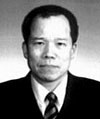
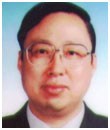
 Jia Chunwang, Ministre de la Sécurité d'Etat de 1985 a 1998. Il fut ensuite Ministre de la Sécurité Publique (La police chinoise) de 1998 a 2002. Il a ensuite exercé les fonctions de Procureur général adjoint du Parquet populaire suprême de décembre 2002 a mars 2003 avant d'être élu Procureur général du Parquet populaire suprême en mars 2003.
Jia Chunwang, Ministre de la Sécurité d'Etat de 1985 a 1998. Il fut ensuite Ministre de la Sécurité Publique (La police chinoise) de 1998 a 2002. Il a ensuite exercé les fonctions de Procureur général adjoint du Parquet populaire suprême de décembre 2002 a mars 2003 avant d'être élu Procureur général du Parquet populaire suprême en mars 2003.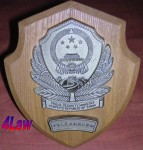 Logo du Gonganbu, Ministère de la Sécurité Publique chinois. Est créé a cet effet en octobre 1949 le Gonganbu (Gongyong Anquan Bu) ,le Ministère de la Sécurité Publique,chargé aussi bien des fonctions de police traditionnelle que du contre-espionnage ,de la lutte contre les opposants politiques ou contre les Triades (Mafias) comme la 14K ou la Sun Yee On et de la gestion des LAOGAI (Le GOULAG chinois).Le Ministère de la Sécurité Publique s'appuie aussi sur des bureaux aussi bien a Beijing que dans les régions,villes (Les Gonganju) La surveillance des étrangers incombait a la Cinquième Division du Gonganbu,dans les années 70,la gestion des LAOGAI de la 8ème Division.Le Gonganbu comptait environ 750000 employés en 1992,contre près de 300000 dans les années 50. Voila pour la sécurité intérieure,"défensive".
Logo du Gonganbu, Ministère de la Sécurité Publique chinois. Est créé a cet effet en octobre 1949 le Gonganbu (Gongyong Anquan Bu) ,le Ministère de la Sécurité Publique,chargé aussi bien des fonctions de police traditionnelle que du contre-espionnage ,de la lutte contre les opposants politiques ou contre les Triades (Mafias) comme la 14K ou la Sun Yee On et de la gestion des LAOGAI (Le GOULAG chinois).Le Ministère de la Sécurité Publique s'appuie aussi sur des bureaux aussi bien a Beijing que dans les régions,villes (Les Gonganju) La surveillance des étrangers incombait a la Cinquième Division du Gonganbu,dans les années 70,la gestion des LAOGAI de la 8ème Division.Le Gonganbu comptait environ 750000 employés en 1992,contre près de 300000 dans les années 50. Voila pour la sécurité intérieure,"défensive".
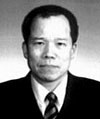
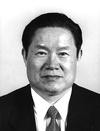 De gauche a droite,Xu Yongyue,actuel patron du Guojia Anquanbu (Poste qu'il occupe depuis 1998) et Zhou Yongkang,actuel patron du Gonganbu.
De gauche a droite,Xu Yongyue,actuel patron du Guojia Anquanbu (Poste qu'il occupe depuis 1998) et Zhou Yongkang,actuel patron du Gonganbu.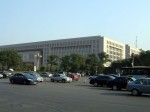 Quartier général du Gonganbu a Beijing,14 Rue Dongchang'an-East Chang'an Street.
Quartier général du Gonganbu a Beijing,14 Rue Dongchang'an-East Chang'an Street.